TURKEY
History

History

Cities in TURKEY
| Akyarlar | Alanya | Ankara |
| Antalya | Beldibi | Belek |
| Bodrum | Colakli | Fethiye |
| Gumbet | Içmeler | Istanbul |
| Kemer | Konakli | Kumkoy |
| Kusadasi | Lara | Marmaris |
| Side |
History
Earliest time
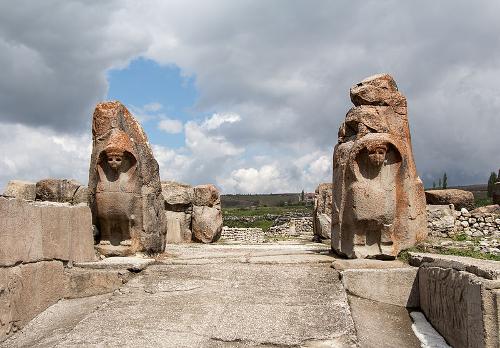 Sphinx Gate, Alaca Höyük, TurkeyPhoto: Bernard Gagnon CC 3.0 Unported no chamghes made
Sphinx Gate, Alaca Höyük, TurkeyPhoto: Bernard Gagnon CC 3.0 Unported no chamghes made
The oldest traces of habitation have been found in Turkey on the Mediterranean coast; 100,000-year-old tools were found in caves near Antalya. Around 2000 BC. a tribe entered present-day Turkey from Central Asia; the Hittites. They managed to take control of much of Asia Minor. In the 9th century BC. the Urartians took over the power of the Hittites and ruled an area that extended over the area of present-day Armenia, Iraq and Turkey.
Greeks and Romans
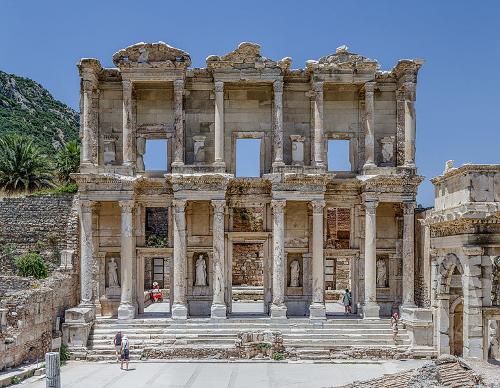 Façade of the Celsus library, in Ephesus, TurkeyPhoto: Benh Lieu Song CC 3.0 Unported no changes made
Façade of the Celsus library, in Ephesus, TurkeyPhoto: Benh Lieu Song CC 3.0 Unported no changes made
Around 1100 BC. colonization from mainland Greece started in the west. The high-quality Ionian culture arose from the combination of Greek culture and influences of the original inhabitants. In the 6th century BC. the Persians conquered the Primal Empire, only the Greek coastal cities retained their independence. After Alexander the Great who died in the 4th century BC. conquered the entire "civilized" world, the Romans conquered in the 2nd century BC. large parts of Asia Minor. In the 2nd century AD. Emperor Constantine moved his capital from Rome to the Greek colony of Byzantium on the Bosporus. The city becomes known as Constantinople, the city of Constantine. Although the western part of the Roman Empire was conquered by Germanic peoples, Constantinople became the center of the Byzantine Empire, which would last for nearly 1,000 years.
Ottoman Empire
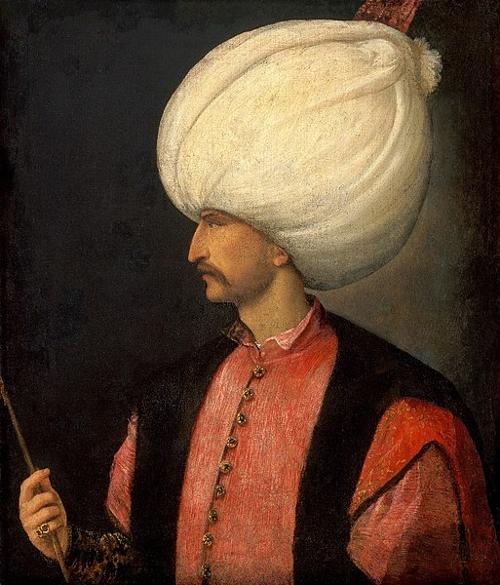 Sultan Suleiman II, TurkeyPhoto: Public domain
Sultan Suleiman II, TurkeyPhoto: Public domain
Around 1300 Osman I founded a dynasty that, after wars won with Mongols and Hungarians, would grow into the powerful Ottoman empire. In 1571, the Turks lost the Battle of Lepanto against the Spaniards and the Venetians. This was the beginning of the downfall of the Ottoman Empire. Slowly the Ottoman Empire crumbled until after the Crimean War the Peace of Paris was signed. The Turks were still able to maintain their independence, but otherwise had little power left. In the 1st World War the Turks sided with the Germans, but after initial successes the Ottoman empire was finally overrun. The Allies divided the Turkish territory after the war. The main damage to the Turkish honor was the fact that the Greeks were allotted the entire Aegean coast and a large part of the hinterland.
Mustafa Kemal Ataturk
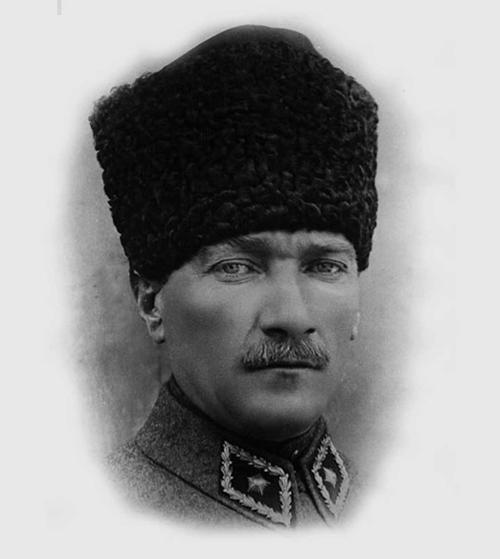 Mustafa Kemal Ataturk, TurkeyPhoto: Public domain
Mustafa Kemal Ataturk, TurkeyPhoto: Public domain
The man responsible for the initial successes in WWI also played a leading role in the Turkish resistance against the Greeks; Mustafa Kemal Atatürk. In 1922, the Turks literally drove the Greeks into the sea and the war of independence came to a bloody end. After negotiations, in 1923 the borders of the current republic of Turkey were largely fixed. The years between 1923 and 1938 were entirely devoted to Atatürk. He built up a state after a Western example. In 1928 Islam was abolished as the state religion; the "layiklik" was introduced, the absolute separation between mosque and state. Atatürk's death on November 10, 1938 was a great shock to Turkey.
Second half of the 20th century
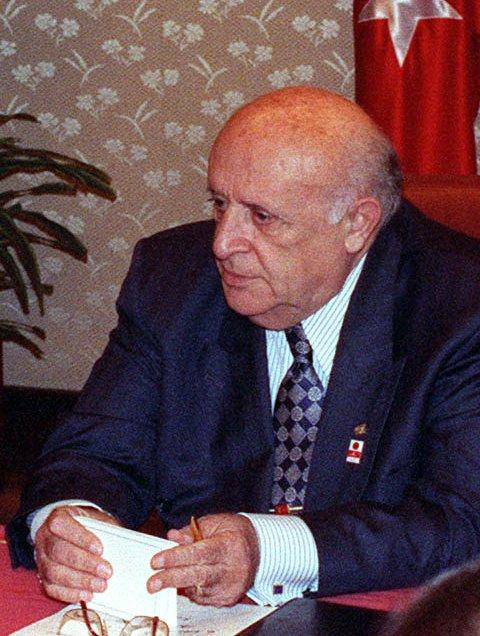 Demirel, TurkeyPhoto:Public domain
Demirel, TurkeyPhoto:Public domain
In WWII Turkey managed to remain neutral until a few weeks before the end of the war. Since the 1950s, Turkey has been continuously tossed between democracy and dictatorship and several coups have taken place accompanied by much political violence. In 1980 General Evren staged a coup d'état. Peace was restored and terrorism was tackled in a bloody way. Democracy was put inactive.
After the adoption of a new constitution, elections were again held in 1983, with Özal's Motherland Party winning the majority. This party paid a lot of attention to stimulating foreign investment. Tourism has also benefited from this since the mid-1980s. After Özal's death in 1993, Demirel was elected president and succeeded by Tansu Çiller, the first female prime minister.
After the 1995 elections, Erbakan became the first Islamic prime minister since the founding of the Turkish republic. Under pressure from the army, Erbakan was forced to resign in 1997. As a result of this issue, discussion has flared up again about the predominant role of the military in Turkish politics. Although Turkey has developed into a modern state on the Western model since the 1980s, a number of problems still exist.
One of them is the Kurdish question. The Kurds are hardly allowed to express their own culture. In the east of the country the PKK is active, which strives for an autonomous Kurdish state. Since 1984 the PKK has been trying to achieve this with great violence. The Turkish government responds equally violently to the actions of the Kurds. In 1999 Kurdish leader Öcalan was imprisoned and sentenced to death.
The human rights situation is also not very encouraging. Torture practices continue to take place in police stations and in prisons. This situation also stands in the way of much-desired membership of the EU.
Period Erdogan
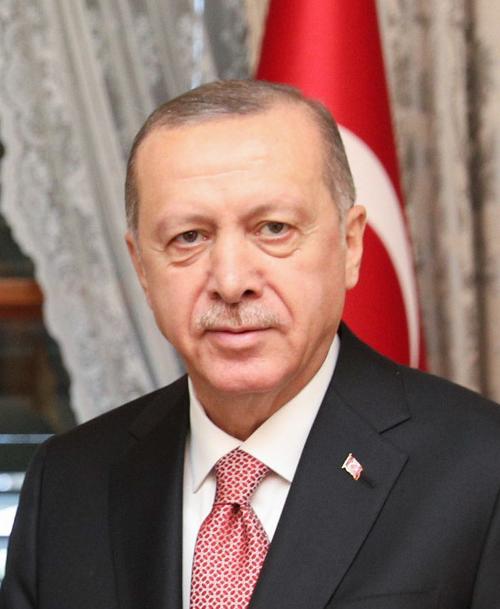 Erdogan, TurkeyPhoto: Mikhail Palinchak CC 4.0 International no changes made
Erdogan, TurkeyPhoto: Mikhail Palinchak CC 4.0 International no changes made
The Islamic Law and Development Party (AKP), led by former mayor Recep Tayyip Erdogan, won a historic monumental victory in the parliamentary elections in November 2002. The AKP got 363 of the 550 seats in parliament. That was just under a two-thirds majority, but the party could form a government without a coalition partner. The center-left Republican People's Party CHP took 19.4% of the vote, accounting for 178 seats. For all other parties, the 10% electoral threshold proved too high, so that the three parties that were part of Prime Minister Bulent Ecevit's incumbent coalition - the Democratic Left Party (DSP), the Motherland Party (ANAP), and the Nationalist Action Party (MHP) , did not return to parliament. So did the largest opposition party, Tansu Ciller's Party of the Right Path (DYP).
In the same month the name of the new prime minister was announced: Abdullah Gül. Gül is the deputy of Recep Tayyip Erdogan, who was unable to hold a board position himself because he was convicted in 1998 of inciting religious hatred. In December 2002, Turkish President Sezer vetoed a law that would allow Erdogan to sit in parliament. The law had recently been passed by parliament, but Sezer felt it was wrong to amend the constitution for just one person. Nevertheless, the constitution was eventually amended and he was able to run in a by-election in the Siirt district. Erdogan won a parliamentary seat there with great odds.
On Friday, March 14, 2003, Tayyip Erdogan was appointed as the new Turkish Prime Minister and presented his new cabinet the same day. The new cabinet consisted of 22 ministers, all belonging to the AK Party, which obtained an absolute majority in parliament in the elections at the end of 2002. Former Prime Minister Abdullah Gül became Deputy Prime Minister and Minister of Foreign Affairs.
When the APK government took office, there was great skepticism, especially in military circles, about the democratic and secular content of the government. Despite this, the government was given the benefit of the doubt. Support for the AKP increased even further in March 2004. During the local elections, the party received 42% of the vote (compared to 34% in November 2002). The top priorities of the AKP are democratization, further reform of the economy and accession to the EU.
A large number of reforms have been implemented in Turkey in recent years. A.o. in order to meet one of the Union's accession criteria, the so-called political criteria. These include democracy, rule of law, human rights and respect for and protection of minorities. Constitutional changes were made in October 2001 and May 2004, and a total of 8 reform packages were adopted by Parliament. Turkey adopted a new criminal code in October 2004. Accession negotiations started on 3 October 2005.
The AKP won the elections in July 2007 and Abdullah Gül was elected president a month later. In 2008 there was the "headscarf affair" for allowing headscarves to be worn in college. There is suspicion among the military in particular about the secular character of the Turkish state under Gül. In 2009, Ahmet Turk provokes a Kurdish leader by addressing parliament in Kurdish. Turkish TV has stopped broadcasting.
In July 2009 there are rapprochements between Armenia and Turkey. In May 2010, Israel and Turkey are at odds with each other as a result of the Israeli attack on a ship seeking to bring relief supplies to Gaza. 9 Turks are killed.
The Turkish government won a referendum on constitutional changes in September 2010. A majority of 58 percent voted in favor of diminishing the power of judges and military; 42 percent voted against. The Turkish constitution dates back to the days of the military dictatorship and Prime Minister Recep Tayyip Erdogan thought it was time to put the citizen first. Moreover, he expected that this would also make Turkey more eligible for accession to the European Union. The opposition warned that the changes would pave the way to turning Turkey into an Islamic state. Polls predicted a neck-and-neck race, but the government won more than expected.
In June 2011 the AKP wins the elections and Erdogan will run for his third term. Tensions with Syria are increasing in 2012 and many refugees are coming to Turkey. In May and June of 2013, protests around Taxim Square were violently crushed. At the end of December 2013, Turkey faces a corruption scandal in which sons of ministers are also accused. In January 2014, Erdogan says it is a plot against his government.
In August 2014, Erdogan won the first directly elected presidential election. In 2015 and 2016, things have been very unsettled in Turkey due to the Syrian refugee crisis and the ongoing disagreement with the Kurds. The ceasefire with the PKK will not last. There are bomb attacks in which both IS and the Kurds are said to be involved. A major conflict arises with the important trade partner Russia after the shooting down of a Russian plane, whether or not in Turkish airspace.
At the end of 2015, the EU and Turkey signed an agreement to stem the flow of refugees to Europe. Prime Minister Davutoglu resigns in May 2016 after arguing with President Erdogan. In June 2016 there was a major attack on Istanbul airport, Turkey assumes that IS is behind this. From 15 to 16 July there is a coup attempt by a group of soldiers, President Erdogan continues to hold power. In August 2016, Erdogan visits Putin in St Petersburg to resolve the conflict over the downing of the plane and restore economic ties. In March 2017, diplomatic tension arose between the Netherlands and Turkey due to the refusal of a Turkish minister who wanted to campaign in the Netherlands for a referendum that wants to give President Erdogan more power. Erdogan wins that referendum with a narrow majority in April 2017, Turkey moves to a presidential system with a lot of power for Erdogan. In January 2018, Turkey starts an offensive against Syrian Kurds. Erdogan is re-elected as president. In June 2019 there is a political setback for Erdogan, the city of Istanbul elects a mayor from the CHP. In the summer of 2020, there are tensions between Greece and Turkey about test drilling for gas that Turkey wants to do in the Aegean Sea.
For Turkey, 2021 was a year marked by its plummeting currency, soaring inflation, and destructive climate change events. The biggest issue for Turkey will remain the economy, which is expected to worsen even further. That could even force Erdogan to call an early election, currently scheduled for 2023.
Sources
Brosnahan, T. / Turkey
Lonely Planet
Graven, R. van den / Reishandboek Turkije
Elmar
Te gast in Turkije
Informatie Verre Reizen
Turkije
Het Spectrum
CIA - World Factbook
BBC - Country Profiles
Copyright: Team The World of Info